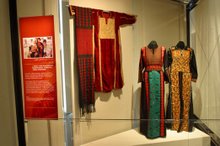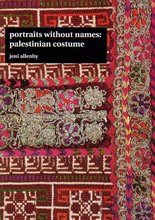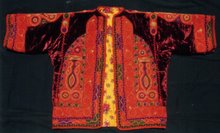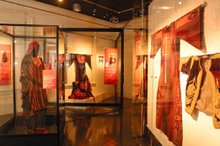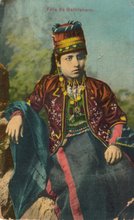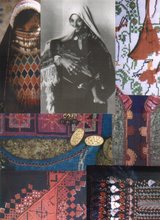When the Palestine Costume Archive first started, in the early 1980s, if you wanted a Palestinian meal anywhere in the Palestinian diaspora you went to family or friends' homes. But wonderfully these days Palestinian cafes and restaurants are springing up all over the diaspora. Archive friends and volunteers regularly ask about them, so we thought we might review some of our favorites.
Let's start with the UK:
Archive staff have several favorites including Habibi Restaurant in Coventry and two in London: Maramia Cafe and Tatreez Cafe. We're going to talk about Tatreez Cafe today. We chose to review it for two reasons. First, it's name :) The word tatreez describes traditional Palestinian embroidery. We loved that the cafe uses this "cross stitched" logo:
Second, because Tatreez Cafe is a designed space, specifically created to evoke Palestinian culture and landscape within a 21st century urban environment. Does it succeed?
It certainly does :) It mixes the modern industrial world (brick walls, burnished metal panels, metal air ducts, etc)
 |
| Source: courtesy Relic Interior London |
with echoes of older traditions (wooden tables and chairs, handwritten blackboard menu,
while components like the form and colour of the huge pizza oven
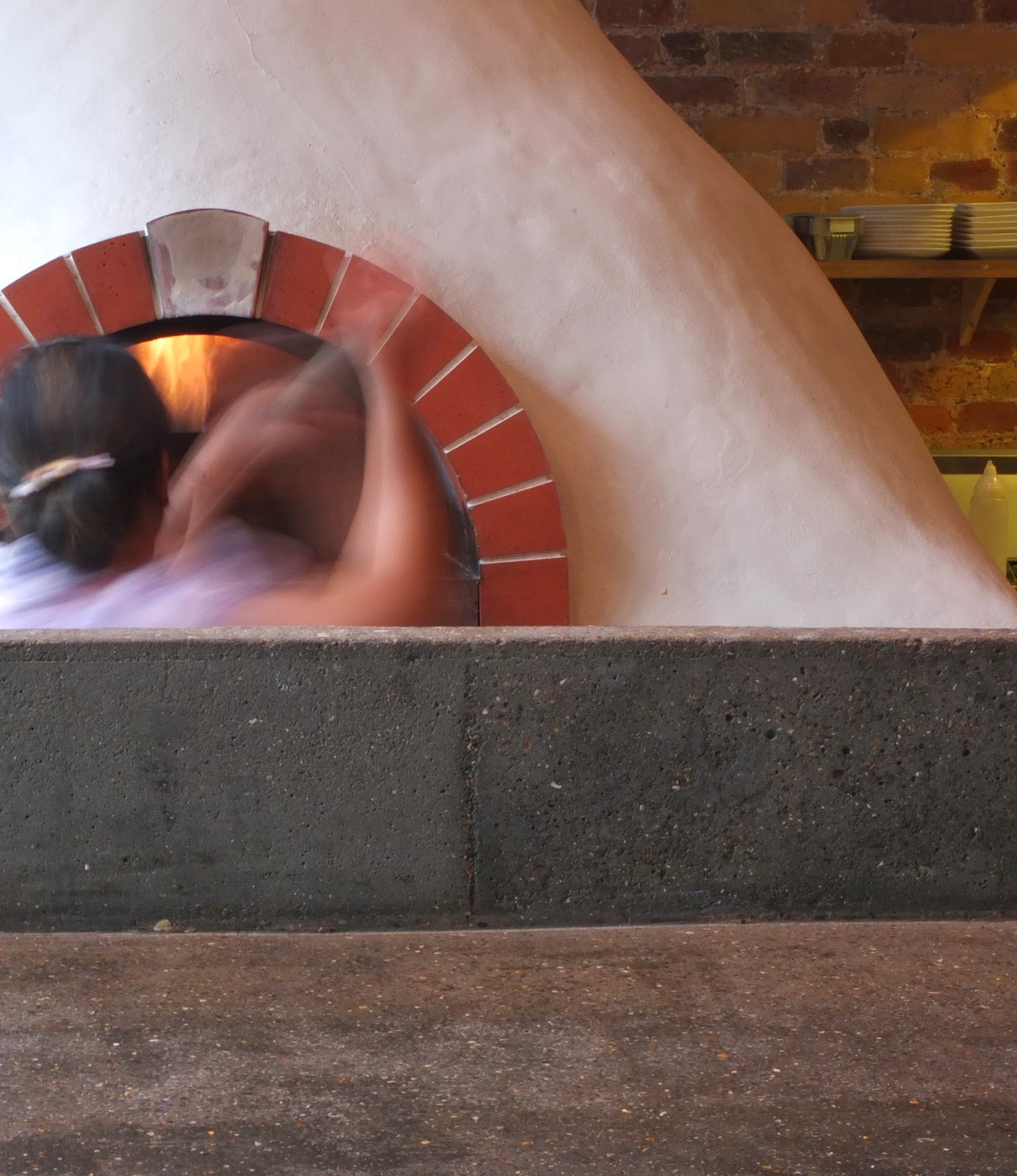 |
| Source: courtesy Relic Interior London |
the shape of the vertical decorative wooden panels and the earth coloured tiled floor
 |
| Source: courtesy Relic Interior London |
as well as these cotton table decorations
evokes the Palestinian village landscape. Tatreez Cafe was designed by Relic Interiors London.
 |
Cafe design
Source: courtesy Relic Interiors |
Interestingly Relic Interiors posted one of their mood boards for the project on their website:
 |
| Source: courtesy Relic Interiors London |
Hang on a moment, you say, one of the embroidery panels in that mood board looks rather familiar. It is indeed. The blue piece at the top towards the centre is a detail of a jumbo cushion embroidered by the Palestine Red Crescent Society in Gaza. Dr Fathi Arafat donated it to our museum. The image has probably been swiped from Flikr, even though we have copyright / all rights reserved stated on those images. Ah well, we don't mind. Perhaps as a return favor Relic Interiors won't mind us using their photographs of Tatreez in this post :) (with source info / links of course)
Anyway, back to our review. We think Relic Interiors did a great job. The Palestinian village feel is enhanced by the use of free hanging black and white poster size photos printed on to fabric of pre 1948 Palestinian village and bedu life.
 |
| Source: courtesy voyagingknave on TripAdvisor |
In his TripAdvisor review voyagingknave identifies these "massive photos on tapestry" as the work of "Palestine's first female photographer". Some look like they are from the Matson Collection / American Colony Photographers to us, but they may well be Karimeh Abbud's (the "Lady Photographer" who was the first female professional photographer in Palestine) as much new information has just been uncovered about her. We'll put up a separate post sometime.
Hopefully the tapestry photo panels at Tatreez Cafe have labels somewhere providing details of the photographer / date / which aspect of Palestinian society they reveal (the bedu desert lifestyle being very different from those of villagers, whose world Tareez Cafe has tried so hard to evoke).
 |
| Source: courtesy Relic Interior London |
A private room provides a further exhibition space:
 |
| Source: courtesy voyagingknave on TripAdvisor |
Owner Hana Haj Ahmad posted this invitation:
"It has been quite a journey full of strong determination & hard work from the start of the visualisation of Tatreez Café up till our opening in June this year. And with the help of our lovely family + talented friends, Tatreez was put together, in style!
"Whilst we were in soft opening mode, we have been working harder and harder to add our unique finishing touch to our beautiful space. Now the time has come to officially celebrate all this hard work, therefore, we invite you to celebrate with us our official opening with a bang! We will be opening our back mezzanine room, outdoor balcony + launching our full brand. We are presenting a photographic celebration of Palestinian embroidery 'tatreez', people + culture. Thanks to our dear friend Daniel Junsei who has helped us immensely to put this together.
"We will also be hosting + highlighting Gilgamesh Publishing house’s recent book ‘Jerusalem, Palestine + Jordan’ by Hisham Khatib who has presented a unique collection of art and printed works, covering the 400-year period of ottoman rule in the region.
The evening will host unique performances that will put you right in the mood to compliment our lovely setting:
8:00
A Middle Eastern band, lead by the amazing ABDEL SALAM KHEIR, that will take you on an authentic 'tarab' journey, performing and singing the most beautiful Arab classics by the likes of giants Umm Kalthoum, Abdel Halim Hafez & Asmahan. Experience enchanting 'tarab', a music that was at its pinnacle in the 50's and 60's, a style of music that is rare nowadays though can still be revived by the likes of Abdel Salam Kheir.
9:30
YAZ FENTAZI TRIO:
YAZ FENTAZI: The Guardian has described Yaz his compositions as having “breadth and atmosphere, and his oud soloing, which recalls the drive and dynamism of world Oud star Anouar Brahem, is often stunning." He was invited to perform record and tour with the Master Drummers of Africa, Robert Plant (of Led Zeppelin), Natacha Atlas, Transglobal Underground,Peter Ind, and the main composer of Fantazia Band and more.
ERIC FORD: Drummer Eric Ford has played a huge variety of music including fusion with Hadrien Feraud (of John McLaughlin's band), Latin jazz with Irvin Acao (of Irakere), soul with Ruby Turner, contemporary jazz with Duncan Eagles' Partikel, Nicolas Meier and many others, as well as theatre shows, pop, rock, blues and much else!
ZAD ADDA: Zad Adda is a virtuoso bass player who grew up with a mix of cultures including North African music, jazz and flamenco. He studied jazz at the Academy of Marseille and he’s the leader and composer of the Beessap Band, based in London.
You can only imagine the result when these masters combine! Book your diaries and come join our celebrations!We've quoted this in full because it gives a great idea of what Tatreez Cafe is all about - which is Palestinian culture in all it's forms. Music continues to be a highlight of the cafe, both in terms of special events and "just happens to be playing while you're eating" events.
 | |
|
But the cafe offers so much more than that. Rana B. Baker got it absolutely write when she reviewed the cafe on Facebook a few months back:
"There's something about this place which really draws me into it; the atmosphere, staff, food, and music all converge to deliver a unique culinary experience, and, with a book in hand, one can add an intellectual flavour to it..."Another Facebook reviewer Merce Benet described the cafe as:
"a really special and unique place in the World. Palestinian pure roots in a radically contemporany soul. Genuine fresh mediterranean food in a jazzy and artistic atmosphere."We were not at all surprised when PalFest began hosting events there.
And then there's the food and drink.
 |
| Source: courtesy Yeah Hackney |
"North West London may be the traditional destination for Middle Eastern eats in our city, but last month saw the official opening in Stoke Newington of Tatreez, a Palestinian eatery serving Levantine and vegetarian food.
"Candlelit and with an exposed brick interior and a selection of (mostly Lebanese) wines and beers, the cafe offers a menu that evidently has an experimental local crowd in mind.
It eschews well-known staples like hummus and falafel in favour of introducing diners to other less famous but equally tasty and authentic Levantine classics such as mana’eesh, a middle eastern style pizza baked in a large white stone oven with toppings such as vegetables with labneh (sour yogurt) and spinach, onion and lemon (mostly £5).
"And no Palestinian restaurant worth its zataar would be complete without foul (fava beans and chickpeas mashed with garlic and lemon and fresh bread, priced £6.50). The makdoos, a pickled aubergine dish, is delicate and delicious, and the food has a fresh and healthy taste. Owner Hana Haj Ahmad says the dishes are made according to her mother’s recipes ... Most fun is the jalab, a date-syrup and rosewater drink with pine nuts."
 |
| Source: courtesy Hackney Citizen blog |
Ellen Hardy from TimeOut also enjoyed her meal:
"After a bowl of Palestinian olives and a couple of easy-drinking Lebanese beers, we had tart makdous – pickled baby aubergines stuffed with walnuts and chilli – fluffy, creamy and warm full-stewed chickpeas, and crisp manaeesh flatbread baked with a cheese and za’atar thyme mix"Martina O writes in her review on yelp:
"Animated owner Hana Haj Ahmad served us mana'eesh, a middle eastern style pizza baked in the afformentioned massive stone oven with labneh, spinach, onion and lemon toppings, we also had the makdoos, a pickled aubergine dish, which is delicious and fried cauliflower, a uniquely distinctive dish which was a favourite of ours."Rana B. Baker found "the thyme and cheese manakeesh are particularly delicious." while Nick Saltmarsh found the fava beans "Some of the best-cooked fava beans I've tasted. And I've tried a few!". Finally Merce Benet suggests patrons "Try the palestinian Za'atar with bread and olive oil...it is just unforgetable! Loved it!"
 |
| Source: courtesy Tatreez Cafe Facebook page |
The Middle Eastern alcohol selection has also provided popular. Ellen Hardy tried "a honeyed Palestinian white wine, but there are also some excellent Lebanese wines", while one yelp reviewer notes: "Top tip, (if you like wine) try the Lebanese wine, as it's one of the most delectable wines that has ever made the journey down my oesophagus."
Reviewer stuart round also notes on Time Out that the cafe is dog friendly.
Tatreez Cafe comes highly recommended from us - it's a tiny, welcoming corner of Palestine and London is richer for it's existence :)
More Info:
- 188 Stoke Newington High St, London, N16 7JD
- Tatreez Cafe on Facebook
- Tatreez Cafe - TripAdvisor reviews
- Tatreez Cafe - Plus Google
- Tatreez Cafe - yelp
- Tatreez Cafe - Time Out
- Hackney Citizen - Palestinian Cafe Tatreez Cafe
- Demotix - Palestinian Festival of Literature at Tatreez Cafe
- Relic Interiors London






















.jpeg)

















